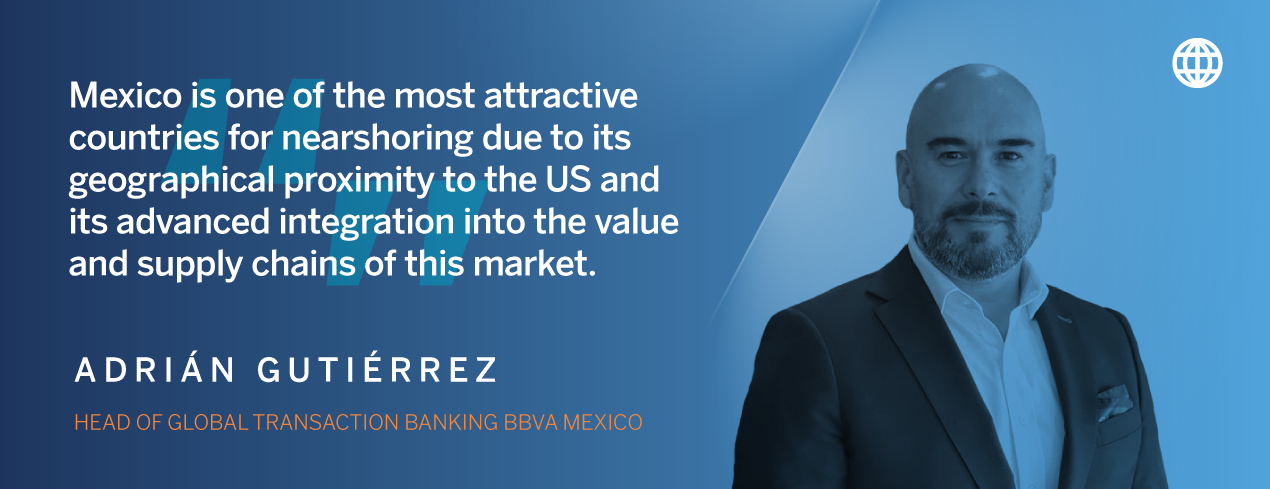
13 November 2023
Nearshoring: efficiency and competitiveness
A brief analysis of the increasing importance of nearshoring and how BBVA CIB occupies a unique position in this growing trend, as told by our experts Ociel Hernández, Head of Research & Strategy BBVA México; Adrián Gutierrez, Head of Global Transaction Banking BBVA México; and Pablo Riquelme, Head of BBVA CIB Asia.
Over the past month, there have been over 3.7 M public mentions related to the nearshoring trend. In our latest LinkedIn Trending Data newsletter, we have cross-referenced this data with the over 821 K mentions linked to #QualityControl and over 430 K to #CostEfficiency, #GlobalSourcing and #Nearshoring to bring you a brief analysis on the rising importance of nearshoring and how we at #BBVACIB occupy a unique position in this growing trend.
For decades, it has been common for companies to delegate part of their operations, processes or management to third parties in very distant locations (offshoring), with the aim of reducing expenses or gaining cost efficiency. However, at present, there is a growing trend toward a closer form of outsourcing – nearshoring – whose relevance has increased significantly since 2017 with the trade war between the United States and China.
BBVA CIB has a solid presence in both Mexico and Asia, two strategic regions for the current nearshoring trend
At BBVA CIB, we are uniquely positioned to be the trusted financial partner in the growing nearshoring trend. Thanks to BBVA's global presence that stretches from Asia to Turkey, Spain and the rest of Europe, Mexico, South America and the United States, our clients can access financial services anywhere in the world. We understand the complexities of this transformative movement represented by nearshoring, and we want to guide our client through every step. To do this, we offer them access to a wide network of channels with which to effectively manage their working capital and financial needs. BBVA CIB has a solid presence in both Mexico and Asia, two strategic regions for the current nearshoring trend, where this trend is taking particular hold in their respective markets.
In the words of an expert
Nearshoring, a transformative movement for companies
According to Ociel Hernández, Head of Research & Strategy BBVA México, in the dynamic context in which we operate, nearshoring becomes a prudent and effective business strategy to optimize operations and maintain competitiveness. The essence of this practice lies in outsourcing specific functions to locations geographically close to their core markets, rather than resorting to destinations farther away on the map. The debate around nearshoring intensified with the outbreak of the COVID-19 pandemic, which disrupted supply chains around the world, and even more so, with the Russia-Ukraine conflict, which increased energy and fuel costs.
Nearshoring offers a number of tangible benefits. As indicated in a study carried out by the consulting firm Michael Page, geographical proximity facilitates more direct communication and supervision of outsourced operations. Additionally, this strategic approach enables financial institutions to quickly adapt to changing market dynamics, fostering greater operational agility and talent diversification, as well as improving operational efficiency without sacrificing service quality. It also helps job creation: This economic strategy is expected to generate a total of 4 million jobs by 2030 in the Latin American region. Mexico offers a natural economic terrain in this dynamic of relocation, since it has a solid free trade agreement with the United States, the most powerful economy in the world, and is an expert in the production and export of manufactures.
Facilitating enterprise nearshoring in Mexico

Mexico has become a crucial destination for companies looking for proximity to their main market, especially if it is the United States. This practice places the country as the main import competitor to the United States against Asian giants such as China, growing by 76% compared to 62% for imports from Asian countries in 2022, as published by the Kearney index.
However, we cannot overlook the complexity of this dynamic: It is essential to address nearshoring by ensuring that the country is not only a participant therein, but also benefits sustainably and meaningfully. This presents different challenges such:
- As limited infrastructure, especially in terms of access to sufficient and sustainably produced electricity, which, together with water supply problems in the northern states, are critical obstacles that could complicate the nearshoring process in the country.
- Uncertainty around how environmental, social, and governance (ESG) criteria will affect this dynamic adds an additional level of difficulty.
A comprehensive and sustainable approach is therefore needed to maximize benefits. The positive impact on GDP and specific sectors, such as real estate, is encouraging, but it is crucial to address structural constraints to ensure economic growth in the future.
To address this set of challenges, the Global Transaction Banking unit, which offers specialized services and advice for managing our clients' entire value chain, will continue to play a key role. With strategic offices in Monterrey and Mexico City, BBVA's International Desk has experts in treasury management, financing of working capital needs and investment in plant and equipment, who provide advice and solutions adapted to the needs of companies establishing themselves in Mexico, taking account of their specific economic sector and their global connection, and thus offering the possibility of communication without borders with the more than 20 BBVA CIB branches around the world.
BBVA CIB in Asia: Almost 50 years of history

For almost half a century, BBVA CIB has cultivated a robust presence in Asia, where today it has a team of 200 professionals and a network of six branches and four representative offices strategically in key cities such as Hong Kong, Shanghai, Singapore and Tokyo. Seamless coordination between a global relationship manager in Asia and local teams ensures personalized service and significant operational benefits.
BBVA CIB has cultivated a robust presence in Asia, where today it has a team of 200 professionals
BBVA CIB's Asian client base includes the major multinationals and financial institutions in the region. Over the years, BBVA has built a strong relationship with them by offering long- and short-term financial support, foreign trade operations, cash management, FX tools, and innovative value-added services.
From a sectoral point of view, there is particular promise in the opportunities that combine the advantages of nearshoring with the leadership of Asian companies in technologies that favor the decarbonization of the economy, such as electric vehicles and batteries.
In short, BBVA CIB's presence in Mexico and Asia not only reflects a global expansion strategy, but also a proactive adaptation to emerging business trends, such as nearshoring. With a comprehensive approach and a global network, BBVA CIB is positioned as a strategic partner for companies looking to grow in key markets.




